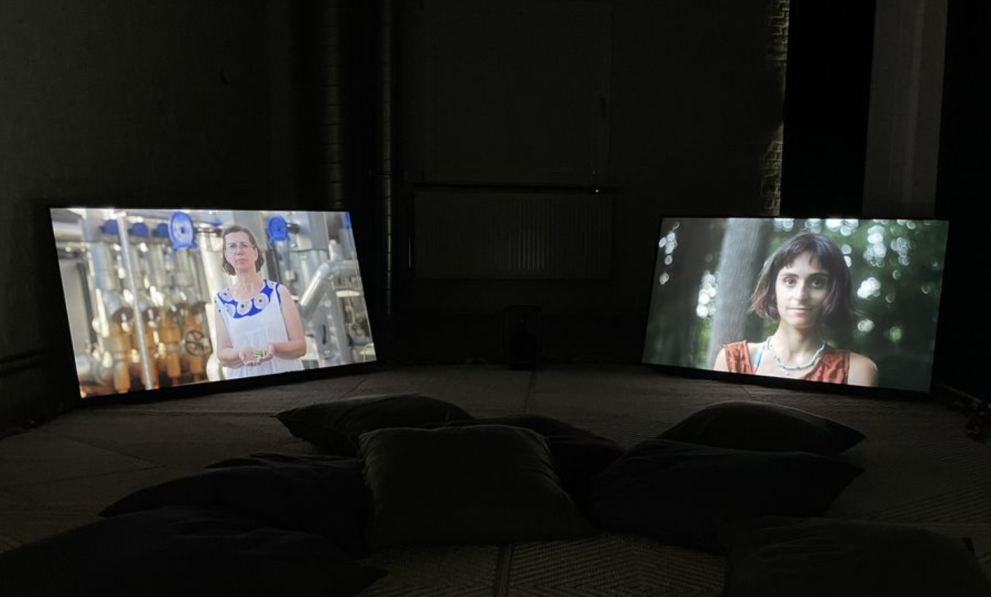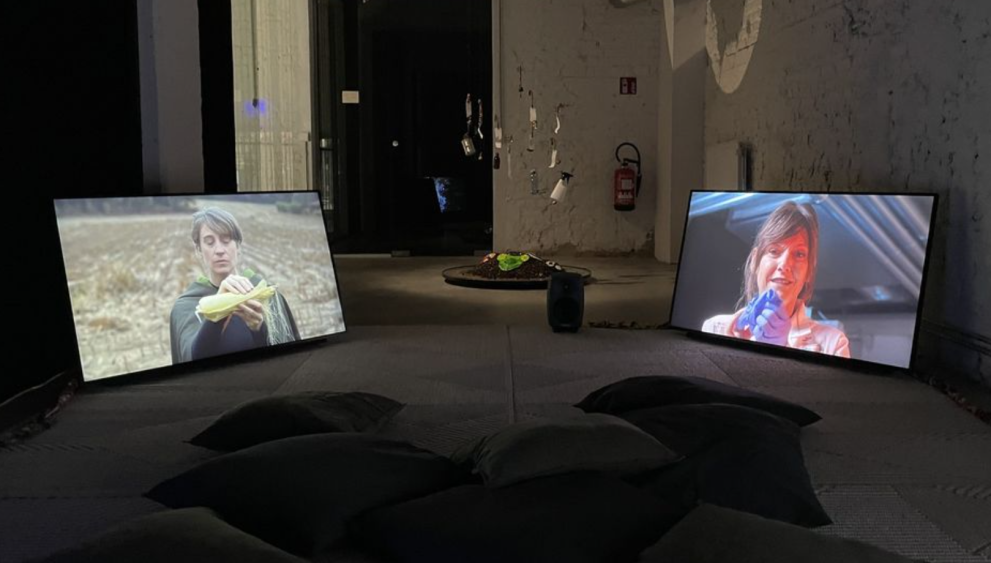
These Relations are Forever weaves together agricultural policy, toxicology, water quality research, environmental law, and art around the common theme of chemical pollution. The scientific practices of four women researchers are conveyed and re-imagined following the thread of Endocrine Disrupting Chemicals (EDC’s), which permeate food, soil, and water, and are increasingly more persistent and everlasting in daily lives.
The four screens form a space across which the collaboratively created rituals are performed. The women communicate, stepping up at key moments to symbolically take part in each of the four rituals, showing support across time and space. In these rituals, methods from dominant scientific practices are woven together with spoken text, movement and symbolic locations and objects. Here ritual is used as a tool to create a moment outside of everyday life, to slow down, be present and show gratitude and to acknowledge the alterations chemicals make to bodies and ecosystems.
Four-channel video installation
Jemma Woolmore | Caterina Cacciatori, Sandra Coecke, Irene Guerrero Fernández & Saskia Vermeylen
Residency Project: https://science-art-society.ec.europa.eu/these-relations-are-forever
Presentation of Residency @ JRC: https://science-art-society.ec.europa.eu/sites/default/files/video-thumbnails/2023-06/these%20relatiosn%20-%20Large%20540p.mp4

Ritual 1, Site: Corn field
Director - Jemma Woolmore
Performer - Jemma Woolmore in place of Irene Guerrero due to illness.
Director of Photography / Camera Operator - Cristina Amate Garcia
Sound production - Tilman Böhnke
Sound Edit and Design - Jemma Woolmore
Sound Mix - Jana Irmert Thank you to Caravati Industria Agricola for the use of their field.
Ritual 2, Site: Laboratory, JRC Ispra
Director - Jemma Woolmore
Performer - Sandra Coecke
Director of Photography / Camera Operator - Cristina Amate Garcia
Sound production - Tilman Böhnke
Sound Edit and Design - Jemma Woolmore Sound Mix - Jana Irmert
Thank you to Jessica Ponti for the use of your lab, to Susanne Bremer-Hoffmann for your advice and to Pascal Colpo for the full exploration of all the lab equipment.
Thank you to all Sandra’s colleagues in the Directorate Health and Food (Units F2 Technologies for Health & F7 Digital Health).
Ritual 3, Site: MDSE, BItterfeld, Germany
Director - Jemma Woolmore
Performer - Saskia Vermeylen
Director of Photography/First Camera Operator: Jubal Battisti
Second Camera Operator: Valentin Braun
Sound production - Thai Tai Pham
Sound Edit and Design - Jemma Woolmore
Sound Design - Christoph Scheurich
Sound Mix - Jana Irmert
Set assistant - Cosmo Schüppel
Thank you to Christian Dorausch, Mrs Grob and the team from MDSE Mitteldeutsche Sanierungs- und Entsorgungsgesellschaft mbH for facilitating our access to their site in Bitterfeld.
Thank you to Kerry-Ann Staton for your music curation.
Ritual 4, Site: Pond JRC ISPRA
Director - Jemma Woolmore
Performer - Caterina Cacciatori
Director of Photography / Camera Operator - Cristina Amate Garcia S
ound production - Jemma Woolmore
Sound Design - Jemma Woolmore Sound Mix - Jana Irmert
Thank you to Virginia Bernardi, Caterina Benincasa, Adriaan Eeckels for all your organisational support and for making this project possible.
Thank you to Kerry-Ann Stanton for your council around ritual, proof reading and general guidance and support.
To Ingeborg Reichle for curatorial support, Christoph Scheurich for holding everything else together throughout this project.
